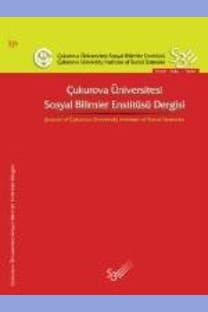AN INVESTIGATION INTO HOW LESSON STUDY PRACTICE RESHAPES AN EFL TEACHER’S BELIEFS REGARDING THE QUALITIES OF EFFECTIVE LANGUAGE TEACHERS
Lesson Study, Teacher Beliefs, Repertory-Grid, EFL Teachers, Professional Development
AN INVESTIGATION INTO HOW LESSON STUDY PRACTICE RESHAPES AN EFL TEACHER’S BELIEFS REGARDING THE QUALITIES OF EFFECTIVE LANGUAGE TEACHERS
___
- Cerbin, W. and Kopp, B. (2011). Lesson study guide. Retrieved June 24, 2016 from http://www.uwlax.edu/sotl/lsp/guide Doig, B. and Groves, S. (2011). Japanese lesson study: Teacher professional development through communities of inquiry. Mathematics Teacher Education and Development, 13(1), 77-93.
- Engeström, Y. (2011). From design experiments to formative interventions. Theory & Psychology, 21(5), 598-628.
- Ilin, G. (2016). Effects of doctorate program on a novice teacher’s conceptualization of an effective teacher: A case study. Educational Research and Reviews, 11(7), 411- 419.
- James, P. (2001). Teachers in Action: Tasks for in-service language teacher education and development. Cambridge: Cambridge University Press.
- Johnson, K. E. (2009). Second language teacher education: A sociocultural perspective. New York: The Routledge.
- Johnston, B. (1997). Do EFL teachers have careers?. TESOL Quarterly, 31(4), 681- 712.
- Lewis, C. (2000). Lesson study: The core of Japanese professional development. Paper presented at the Annual Meeting of the American Educational Research Association Meetings, New Orleans.
- Lewis, C., Perry, R. R. and Hurd, J. (2009). Improving mathematics instruction through lesson study: A theoretical model and North American case. Journal of Math Teacher Education, 12, 285-304.
- Penuel, W. R. (2014). Emerging forms of formative intervention research in education. Mind, Culture and Activity, 21(2), 97-117.
- Roberts, J. (1998). Language teacher education. New York: St. Martin’s Press.
- Sendan, F. & Roberts, J. (1998). Orhan: A case study in the development of a student teacher's personal theories. Teachers and Teaching: Theory and Practice, 4(2), 229-244
- Shen, Y. (2008). The effect of changes and innovation in educational development. International Education Studies, 1(3), 73-77.
- Stigler, J. W. and Hiebert, J. (2009). The teaching gap: Best ideas from the world’s teachers for improving education in the classroom. New York: The Free Press.
- Tasker, T. C. (2014). Exploring EFL teacher professional development through lesson study: An activity theoretical approach. Unpublished Ph.D Dissertation, The Pennsylvania State University, The USA.
- Yaman, S. (2008). A Case Study of an EFL Teacher’s Personal & Professional Development: Employing Repertory Grid Elicitation Technique. Boğaziçi University Journal of Education, 25(1), 25-41.
- Zepeda, S. J. (2012). Professional Development: What works (2nd edition). New York: Routledge.
- ISSN: 1304-8880
- Yayın Aralığı: 2
- Başlangıç: 2013
- Yayıncı: Çukurova Üniversitesi Sosyal Bilimler Enstitüsü Dergisi
COĞRAFİ KEŞİFLERİN EKONOMİ VE KAMU YÖNETİMİ SİSTEMİNE KATKILARI: MERKANTİLİZM VE KAMERALİZM
DOĞAL GAZ TALEBİNİN ESNEKLİĞİ: SEÇİLMİŞ AVRUPA BİRLİĞİ ÜLKELERİ VE TÜRKİYE ÖRNEĞİ
Mustafa ILDIRAR, Harun BAL, Müge MANGA
MARKOV ZİNCİRLERİ KULLANILARAK SEÇMEN TERCİHLERİNİN TAHMİN EDİLMESİ
Selim GÜNDÜZ, Sevim Gülin KIRAL
Betül KARADUMAN, Tuğba YANPAR YELKEN
YAŞAR KEMAL’İN ‘BİR ADA HİKÂYESİ’NDE İYİ BİR TOPLUM ARAYIŞININ SOSYOKÜLTÜREL TEMELLERİ
AUDIT REPORT DELAY AND AUDIT FIRM ROTATION IN TURKEY
Koray TUAN, Mehmet Ünsal MEMİŞ, Faruk KAYGUSUZ, Zeinab CHEGİNİ
PRESENTEİZM VE İŞ TATMİNİ ARASINDAKİ İLİŞKİ-TURİZM SEKTÖRÜNDE BİR ARAŞTIRMA
TANITIM FAALİYETLERİNİN TURİZM ÜZERİNE ETKİSİNİN ANALİZİ: ARDL MODELDEN KALINTILAR
Mehmet Tahsin LİCELİ, Mehmet Oğuzhan İLBAN
2008 KRİZİ SONRASI PORTEKİZ EKONOMİSİNDE İŞSİZLİK: AMPİRİK BİR ANALİZ (2000-2018)
